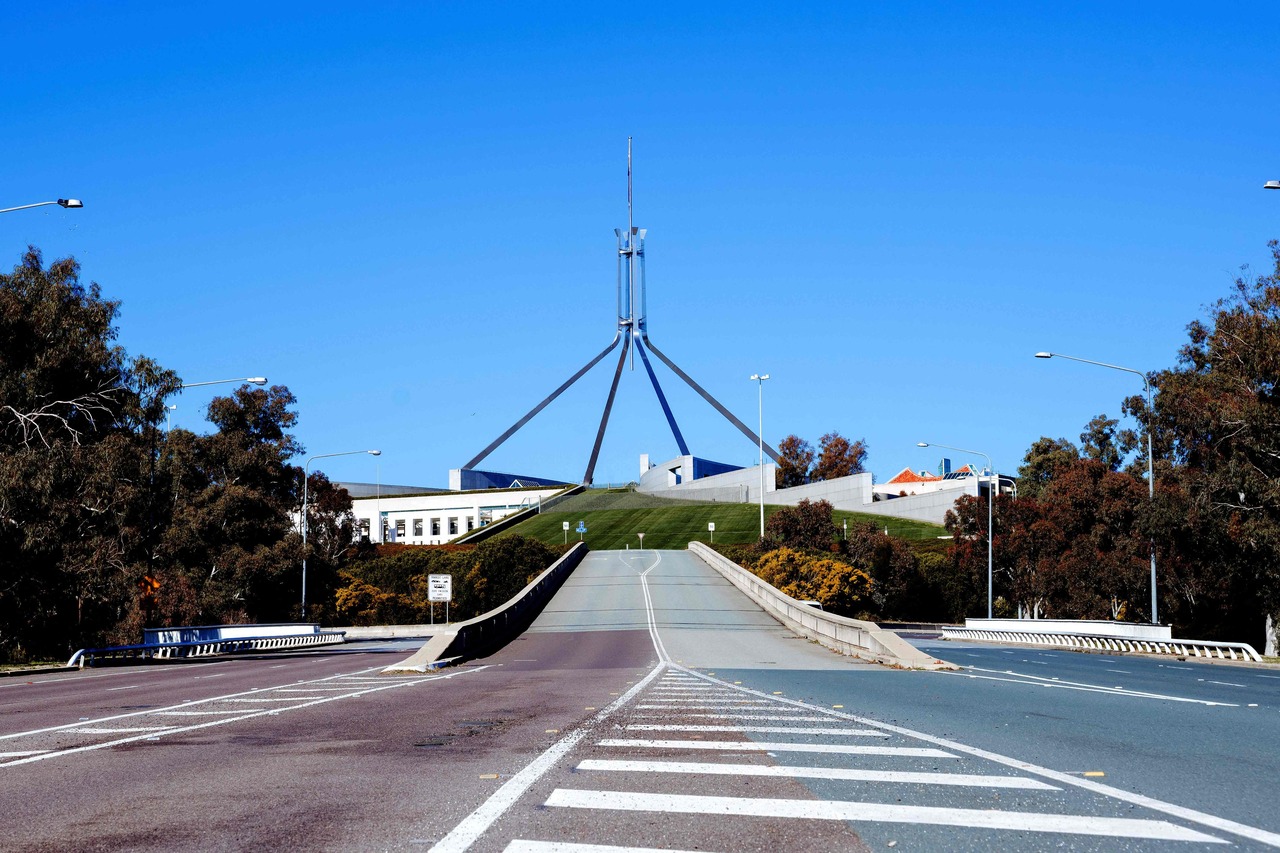Fica's scope narrower than that of similar US, Australian laws on foreign agents, says Shanmugam
Sign up now: Get ST's newsletters delivered to your inbox

A general view of the empty roads around the Parliament House building in Canberra, on Aug 13, 2021.
PHOTO: AFP
Follow topic:
SINGAPORE - An American citizen who works for a multinational corporation, and meets a Congressman to advocate for a product made by his company, will have to be registered as a foreign agent under United States law.
Any former Commonwealth politician doing the same in Australia, including a former minister, MP or member of any political party, will also have to be registered under similar Australian laws.
These two scenarios, though, will not trigger such a registration requirement under Singapore's proposed Foreign Interference (Countermeasures) Act, or Fica, Home Affairs and Law Minister K. Shanmugam told Parliament on Monday (Oct 4).
The US law covers people and organisations that are under control of a foreign government or outside of the US, while the Australian law covers government-related entities and individuals that have arrangements with foreign principals or undertake certain activities on their behalf.
Comparing Fica to the US' Foreign Agents Restriction Act or Fara, and Australia's Foreign Influence Transparency Scheme or Fits, Mr Shanmugam said Singapore has deliberately taken a much narrower definition of politically significant persons.
Under Fica, meant to counter foreign meddling in Singapore's affairs, a competent authority can designate other individuals and entities as politically significant persons if their activities are directed towards a political end and it is in the public interest that countermeasures be applied.
When it comes to hostile information campaigns, action can be taken if the minister assesses it is in the public interest to do so against Internet activity that is made on behalf of a foreign principal.
Public interest and proportionality
Mr Shanmugam said there is a high bar to cross for something to be deemed in the public interest, and it must be "necessary" or "expedient".
The actions taken to counter any hostile act must also be proportional, he added.
Noting that there has been some misrepresentation of Fica, he cited scenarios that would not be covered under the law.
For instance, open, non-clandestine collaboration between a Singaporean and any ordinary, private foreign citizen to improve any aspect of Singapore's laws and public policies, as well as local academics conducting research with foreign connections, will not come under Fica as long as they are bona fide.
"So the vast majority of collaborations, linkages will not meet the required conditions, and they will also not meet the requirement of proportionality," said the minister.
Referring to an example raised by Workers' Party MP Jamus Lim (Sengkang GRC), he said that if a foreigner writes an article on controversial issues, using his own name, or clearly identifying as a foreigner, readers can assess the value, credibility and weight of the article.
In such a situation, the criterion of public interest would not be met.
Similarly, if the Economist magazine or New York Times merely publishes articles critical of Singapore, it will not be possible to invoke Fica.
However, if there is a basis to believe that these activities are undertaken as part of a hostile campaign or on behalf of a foreign agency targeting Singapore, then a Fica direction could be issued, subject to the test of proportionality, said Mr Shanmugam.
He added that newspapers and news wires, even legitimate ones, have often been use as a front for such activities, "so you cannot give a carte blanche exception".
Some academics have also raised concerns that presenting research at overseas conferences, writing for international journals and participating in international collaborative research projects may run afoul of the law, since any of these activities may be subsidised or fully funded by foreign universities, foundations and states.
Mr Shanmugam said on the face of it, none of the examples described will fit into Fica, though the assessment changes if "there is a step up to try and turn the person to an agent of influence, or there is an orchestrated campaign".
There have been some situations where academics have gone "into a different realm", he added, referring to the 2017 case of prominent Lee Kuan Yew School of Public Policy academic Huang Jing.
He had his permanent residency cancelled for working with a foreign government to sway public opinion and influence Singapore's foreign policy.
The vast majority of academic work will not fall under Fica, Mr Shanmugam said.
"Some of these doomsday scenarios - that Fica is a way to close off foreign collaborations - if that is correct, we as a government must have suddenly gone mad," he added. "In a country like Singapore which depends so much on the flow of ideas and international collaboration, is that even thinkable?"
On the issue of proportionality, Mr Shanmugam noted that the Attorney-General's Chambers has advised that the test is applicable to Fica, though some lawyers have expressed the view that it does not apply.
"This is the intent behind the legislative approach, which we are setting out clearly, for reference, so that if this Bill becomes law, and if it needs to be interpreted, it will be interpreted in the light of what the Government has said is the legislative intent, and how the phrases are intended to cover these things," said the minister.
Out of 10,000 interactions, there may only be one attempt of foreign interference in which foreign agencies and non-governmental organisations try to present a legitimate front, said Mr Shanmugam.
"So the language has got to be broad enough to cover that which is apparently normal, but is actually not normal," he said, noting that many governments face this difficulty.

